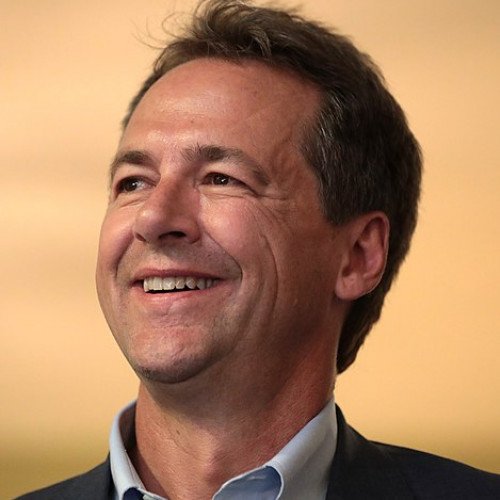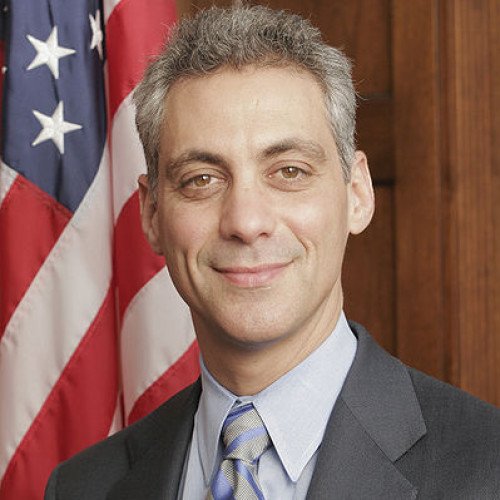Steve Bullock VS Rahm Emanuel

Steve Bullock
Stephen Clark Bullock (born April 11, 1966) is an American politician and lawyer, who served as the 24th governor of Montana from 2013 to 2021. He is a member of the Democratic Party. Born in Missoula, Montana, Bullock graduated from Claremont McKenna College and Columbia Law School. He began his career working as legal counsel to the Secretary of State of Montana before becoming the Executive Assistant Attorney General and acting Chief Deputy Attorney General of Montana. Bullock then entered private practice as a lawyer for Steptoe & Johnson. He was an adjunct professor at George Washington University Law School before opening his own law firm upon returning to Montana. In 2008, Bullock was elected Attorney General of Montana, and he served one term from 2009 to 2013. Bullock declared his candidacy for governor of Montana on September 7, 2011. The seat was open in 2012, as incumbent governor Brian Schweitzer, a Democrat, could not seek reelection due to term limits. Bullock won the Democratic primary with 87% of the vote and defeated Republican former Congressman Rick Hill in the general election with 48.9% of the vote. In 2016, Bullock was reelected with 50.2% of the vote, defeating Republican nominee Greg Gianforte. Bullock chaired the National Governors Association from 2018 to 2019. He was a Democratic candidate for President of the United States in 2020. After suspending his presidential campaign, he announced his candidacy for the United States Senate in the 2020 election. On November 3, Bullock lost to incumbent Senator Steve Daines.
Statistics for this Xoptio

Rahm Emanuel
Rahm Israel Emanuel (; born November 29, 1959) is an American politician who served as the 55th mayor of Chicago from 2011 to 2019. A member of the Democratic Party, he previously served as the 23rd White House Chief of Staff from 2009 to 2010, and as a member of the United States House of Representatives from Chicago between 2003 and 2009. Born in Chicago, Emanuel is a graduate of Sarah Lawrence College and Northwestern University. Working early in his career in Democratic politics, Emanuel was appointed as director of the finance committee for Bill Clinton's 1992 presidential campaign. In 1993, he joined the Clinton administration, where he served as the assistant to the president for political affairs and as the Senior Advisor to the President for policy and strategy. Beginning a career in finance, Emanuel worked at the investment bank Wasserstein Perella & Co. from 1998 for 2½ years, and served on the board of directors of Freddie Mac. In 2002, Emanuel ran for the seat in the U.S. House of Representatives vacated by Rod Blagojevich, who resigned to become governor of Illinois. Emanuel won the first of three terms representing Illinois's 5th congressional district, a seat he held from 2003 to 2009. As the chair of the Democratic Congressional Campaign Committee, he oversaw Democratic wins in the 2006 United States House of Representatives elections, allowing the party to gain control of the chamber for the first time since 1994. After the 2008 presidential election, President Barack Obama appointed Emanuel to serve as White House chief of staff. In October 2010, Emanuel resigned as chief of staff to run as a candidate in Chicago's 2011 mayoral election. Emanuel won with 55% of the vote over five other candidates in the non-partisan mayoral election, succeeding 22-year incumbent Richard M. Daley. At his reelection, although Emanuel failed to obtain an absolute majority in the February 2015 mayoral election, he defeated Cook County board commissioner (and later U.S. Representative) Jesús "Chuy" García in the subsequent run-off election in April. In late 2015, Emanuel's approval rating plunged to "the low 20s" in response to a series of scandals. These followed and were attributed to the police shooting of 17-year-old Laquan McDonald, the city's subsequent attempts to withhold a video of the shooting, and the lack of an investigation into the matter. Emanuel initially announced in October 2017 he planned to run for a third term, but on September 4, 2018, he reversed his decision and announced that he would not seek a third term due to personal obligations. The Chicago Tribune assessed Emanuel's performance as mayor as "mixed." At one point, half of Chicagoans favored Emanuel's resignation. He later made steady progress in recovering his political support. He left office in May 2019 and was succeeded by Lori Lightfoot.